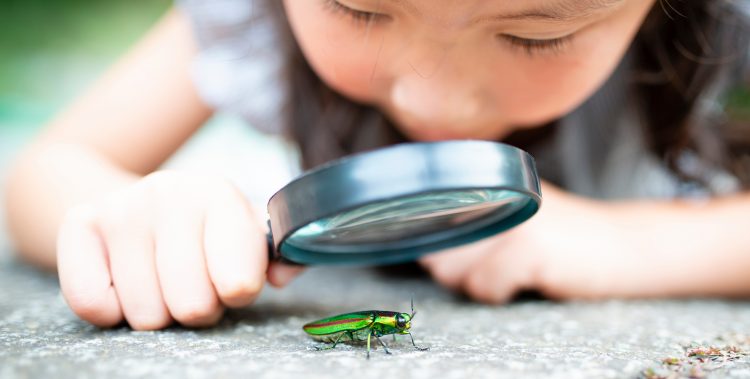
Benefits of Bugs: Why you should let your kids play with insects
On May 30, 2022 by Calgary's ChildBy Stacie Gaetz
There is no doubt about it – kids are fascinated by bugs.
Anything creepy and crawly seems to attract children. Whether they dive right in and get down and dirty or watch from afar with caution, they are interested in insects.
Although it may seem gross to some, insects are a great way to teach your kids a number of skills without them even realizing it.
Many parents are worried about kids getting stung or bitten but with the right cautions, bugs can be a beneficial addition to your kids’ education (and a lot of fun to explore!).
Alleviating Fear
Keep in mind that although you should teach your children which insects can bite or sting, it is important to try not to instill unnecessary fear in them with your actions.
If you shriek and run away every time you see a spider or hear a buzz, your children will do the same.
Knowledge really is power so take the time to read books and watch videos about insect to learn more about them. When you see all of the amazing things spiders can do (and realize that most of the arachnids in Alberta cannot harm anyone except a fly), you might be more prone to observe the interesting things they are doing instead of running away.
Another good tip for children is to tell them to stay still when they hear or see a bee or wasp and let them know that the insects don’t actually want to bite or sting them, they only do so if they feel threatened by sudden movements and loud noises.
It is important to be cautious around some insects but that is just another reason it is so valuable to learn as much as you can about the bugs you find.
Instilling Empathy
Bugs are also a great opportunity to help teach your child about kindness and empathy. Although many children love to stomp ants or squish worms, ask them how they would feel if someone did that to them.
One dead bug here and there may not seem like a big deal, but it can teach your child a lot of compassion if you choose to put that spider in a cup and take it back outside rather than stepping on it.
Teach them that touching a butterfly can remove the scales that help protect their wings and result in them having trouble to fly or possibly shortening their life span.
Let them know that they shouldn’t destroy that ant hill with a stick because of all of the amazing things going on inside of it and allow them to watch a video of the hard-working insects as proof.
Stimulating Science
Bugs help kids learn about endless concepts.
These include STEM (the way insect bodies are engineered), habitat (where they live and what they eat), lifecycles, counting (how many legs does this one have?), biology and other parts of nature like plants and trees among many other topics.
Playing with bugs can even help your children learn how to research a topic. The next time your little one has a question about creepy crawlies, turn it back to them and ask them how you could find out the answer – Should you go to the library to find a book, look it up online, ask an expert, visit the zoo to learn more?
Nurturing Nature
This one is pretty obvious – bugs live outside. Getting children outdoors to explore their environment is always a positive thing.
You can explore the differences in the bugs in your backyard and your local park. Maybe grandma has more butterflies in her yard. Why do you think that is?
They can see how spiders may seem creepy but they catch mosquitos in their webs and that controls the population so there are not so many to bite us.
They can learn about the fact that birds eat bugs so without some slimy worms, we wouldn’t hear the beautiful song of a robin in the morning.
This can also help to teach them respect. They shouldn’t destroy plants or trees because they are home to so many insects that help us out.
A great example of this is learning about how bees are connected to growing crops and how we wouldn’t have food it if it weren’t for the often feared and fuzzy insects.
Hands On
Children learn better by doing. Books and videos are helpful learning tools, but nothing beats the ability to see and touch something real right in front of you.
A child will learn exponentially more by watching a caterpillar transform into a beautiful butterfly in an at-home butterfly garden, than they would looking at a diagram of the insect’s lifecycle.
There are tons of inexpensive tools that you can use to help your little learner get even more out of their bug hunting, capturing and discovering journey. Items like nets, binoculars, bug traps, insect vacuums and magnifying glasses can all help them get a closer look (before quickly releasing their friend back into the “wild”).
There are also the aforementioned butterfly gardens and at-home ant farms that allow you to bring the fun indoors.
So the next time you are about to steer your child away from touching the bug they are following, take a second to stop and think about all of the things you could learn together as you crouch down and check out the creepy crawly with them.
Recent Posts
Recent Posts

What’s New This Week?
Looking for fun things to do this week? We've got exciting activities for the whole family in all quadrants of the city.View all...
Archives
- November 2024
- October 2024
- September 2024
- August 2024
- July 2024
- June 2024
- May 2024
- April 2024
- March 2024
- February 2024
- January 2024
- December 2023
- November 2023
- October 2023
- September 2023
- August 2023
- July 2023
- June 2023
- May 2023
- April 2023
- March 2023
- February 2023
- January 2023
- December 2022
- November 2022
- October 2022
- September 2022
- August 2022
- July 2022
- June 2022
- May 2022
- April 2022
- March 2022
- February 2022
- January 2022
- November 2021
- October 2021
- August 2021
- July 2021
- June 2021
- April 2021
- March 2021
- February 2021
- January 2021
- December 2020
- November 2020
- October 2020
- September 2020
- August 2020
- July 2020
- June 2020
- May 2020
- April 2020
- March 2020
- February 2020
- January 2020
- December 2019
- November 2019
- October 2019
- September 2019
- August 2019
- July 2019
- June 2019
- May 2019
- April 2019
- March 2019
- January 2019
- December 2018
- November 2018
- September 2018
- August 2018
- July 2018
- March 2018
- February 2018
- December 2017
- November 2017
- September 2017
- August 2017
- July 2017
- June 2017
- May 2017
- March 2017
- February 2017
